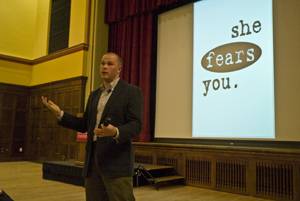Lecture discusses rape issues

Keith Edwards, director of campus life at Macalester College and founder and director of the organization Men Ending Rape, gave a lecture in the Great Hall of the Memorial Union Monday discussing how women and men can work together to end campus rape.
October 6, 2008
One in four college women reports surviving rape or attempted rape.
Keith Edwards, director of campus life at Macalester College in St. Paul, Minn., used dialogue and shocking truths, such as the one above, in his presentation Monday, titled “Men Ending Rape.”
Edwards focused on male-female rape cases, with men as the pursuers and women as the victims. He said he knows there are other sexual assaults that occur, but he wanted to concentrate on the most common one.
“Rape that happens on campus shows mainly men as perpetrators and women as victims or survivors,” Edwards said. “This is the case in 99 percent of sexual assaults on campus.”
Edwards said he wants to be proactive about the situation by reaching out to perpetrators and men.
He said audiences often have adverse reactions to his approach, when he shows a poster that says, “She fears you.” Men get upset.
“The guy in the audience stands up and he says, ‘I hate this poster, it pisses me off. You’re creating fear where fear didn’t exist.’ Well, when I ask women if they think another woman has feared this man at night, almost all of them say ‘yes,’ while he was saying, ‘No way, not me, man.’” Edwards said. “That statement turns that guy’s world upside-down.”
Edwards said he knew women feared him when he walked alone at night on campus.
“And how do I know she fears me? She pulls out her cell phone and hits three numbers, waiting to dial until I pass,” Edwards said. “She calls a friend, crosses the street to avoid me, figures out ‘How close is he and how fast can I run to a security phone?’ This does not make me feel powerful, manly or in control; it makes me feel small, nauseous and furious. I am not seen for my integrity, my intelligence or my caring. I’m a potential rapist until proved otherwise. And I will do anything I can to prove that she doesn’t need to fear me, but I don’t know how to do that. I’m desperate to prove she doesn’t need to be afraid.”
He said his anger is directed at men who rape, who make those thoughts logical and rational. Most of the perpetrators, he said, are usually thought to be easy to point out, someone they “could see a mile away,” a “dirty trash-digger.” What women don’t realize is they usually know the attacker. It’s guys they know about, care about, he said.
Edwards said the worst part is most men do not know the meaning of rape. They don’t know they need to have informed consent to complete any sexual acts, no matter how drunk they both are, or how willing the victim seems.
“You can’t have informed consent when you’re nine, developmentally disabled, unconscious, drugged or drunk,” Edwards said.
He said our culture is a “rape culture” that encourages, condones and teaches men to commit rape through seemingly innocent T-shirts, staged television scandals, such as Justin Timberlake and Janet Jackson at the Superbowl, and sexual conversations. Edwards said these are all disappointing parts of our culture.
Edwards travels the country giving his presentation to school after school, not just to educate, but for “all the women I never knew.”
















